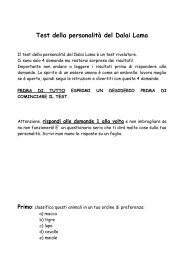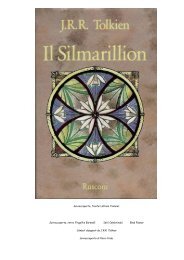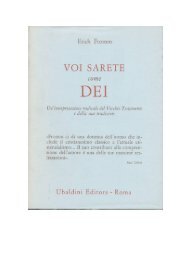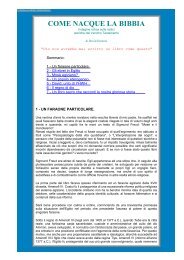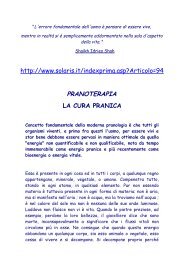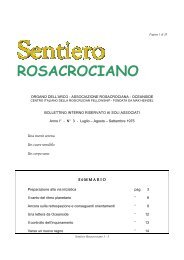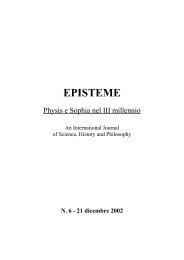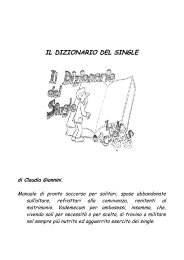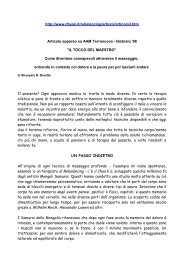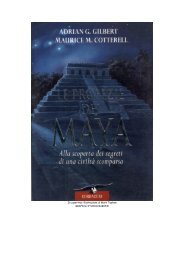- Page 1 and 2:
EPISTEME Physis e Sophia nel III mi
- Page 3 and 4:
EPISTEME Physis e Sophia nel III mi
- Page 5 and 6:
INFORMAZIONI EDITORIALI - - - - - E
- Page 7 and 8:
Files of the papers, in doc or txt
- Page 9 and 10:
del Rainbow portrait della regina E
- Page 11 and 12:
EFFICERE DEOS La forma religiosa co
- Page 13 and 14:
narrativa, utilizzando "vesti" appa
- Page 15 and 16:
ma è il preciso modo di allogare i
- Page 17 and 18:
intellettuale s'identificano 47 cos
- Page 19 and 20:
13 questo ruolo di medium è stato
- Page 21 and 22:
Dionigi ma soltanto nel XII sec. pe
- Page 23 and 24:
ciclica della storia, nel favoleggi
- Page 25 and 26:
trasportato re Artù, mortalmente f
- Page 27 and 28:
le sponde orientali dell'Orbis Terr
- Page 29 and 30:
all'inclusione del nuovo continente
- Page 31 and 32:
che, in seguito al distacco dalla C
- Page 33 and 34:
parte, poiché continua ad ostacola
- Page 35 and 36:
per la sua immensa estensione, fa e
- Page 37 and 38:
propria campagna di pubblica vendit
- Page 39 and 40:
ufficiale che legalizzasse il loro
- Page 41 and 42:
Maryland in cerca di nuove possibil
- Page 43 and 44:
climatiche e geografiche affini a q
- Page 45 and 46:
civiltà, gli Indiani vivevano un r
- Page 47 and 48:
sorpresa, in piccoli gruppi o anche
- Page 49 and 50:
completamente irradiato la Indian w
- Page 51 and 52:
americana ante-litteram. Si possono
- Page 53 and 54:
già determinato a priori, quanto a
- Page 55 and 56:
vigore e barbarie, innocenza e paga
- Page 57 and 58:
Note 1 M. Eliade, Mythes, rêves et
- Page 59 and 60:
20 C. Bartocci, Gli Inglesi e l'Ind
- Page 61 and 62:
Amsterdam nel 1637. Morton accusa i
- Page 63 and 64:
América Latina en búsqueda del ca
- Page 65 and 66:
los países que "llevan la delanter
- Page 67 and 68:
Pero sí nos atrevemos a prever que
- Page 69 and 70:
Las razones de la duda Hay cierta c
- Page 71 and 72:
del paradigma del nómada en el del
- Page 73 and 74:
incertidumbre del mañana, porque n
- Page 75 and 76:
ecogedor al del campesino-productor
- Page 77 and 78:
establecimiento de empresas agríco
- Page 79 and 80:
paradigma productivo sino algo much
- Page 81 and 82:
tropezó con el continente american
- Page 83 and 84:
El mapa conceptual Bibliografía -
- Page 85 and 86:
13 Es bien conocido como en uno de
- Page 87 and 88:
L'ENIGMA DELLE PIETRE DI ICA (Lucia
- Page 89 and 90:
I contadini del luogo, di generazio
- Page 91 and 92:
comprare egli stesso quante più pi
- Page 93 and 94:
dell'Università di Bonn. I risulta
- Page 95 and 96:
tecnologia avanzatissima, patrimoni
- Page 97 and 98:
Insolito": "Si sa che le foglie si
- Page 99 and 100:
Sempre nella serie sulla chirurgia
- Page 101 and 102:
pietre che mostrano gli emisferi te
- Page 103 and 104:
ENDOCRINOLOGIA GLITTOLITICA Da poch
- Page 105 and 106:
Qualche commento in proposito… (c
- Page 107 and 108:
Le "spiegazioni" degli "avversari"
- Page 109 and 110:
Le pietre magiche precolombiane res
- Page 111 and 112:
Allora veniamo all'ipotesi, o alla
- Page 113 and 114:
dinosauri, che eseguono trapianti d
- Page 115 and 116:
Come, da soli, o grazie a poche rig
- Page 117 and 118:
such things have known for a long t
- Page 119 and 120:
vengono fotografati e descritti nel
- Page 121 and 122:
dans la région. Qu'en est-il de ce
- Page 123 and 124:
discutibile, e soprattutto abusata
- Page 125 and 126:
distinzioni, testimoniata soprattut
- Page 127 and 128:
permane una difficoltà decisiva: c
- Page 129 and 130:
1. Introduzione Matematica e Comput
- Page 131 and 132:
2. Due tappe fondamentali del Calco
- Page 133 and 134:
T. Pentilla & G.F. Royle, On Hypero
- Page 135 and 136:
M. Giulietti and R. Casse, Gruppi d
- Page 137 and 138:
6. Appendice La spirale della creat
- Page 139 and 140:
Nel secolo dei lumi ,infatti, si ri
- Page 141 and 142:
che le congetture di un moderno opp
- Page 143 and 144:
Note 1 C.P. Snow : Le due culture,
- Page 145 and 146:
creati con la parte più influente
- Page 147 and 148:
Naturalmente, così come era stato
- Page 149 and 150:
doveva più propriamente assumersi
- Page 151 and 152:
1.4 L'autunno del 1688 Era chiaro c
- Page 153 and 154:
Due sono i punti saldi sui quali Le
- Page 155 and 156:
questa ipotesi sta il fatto che, a
- Page 157 and 158:
mercurio, discenda da V verso T, la
- Page 159 and 160:
4. Un secondo Tentamen Come si evin
- Page 161 and 162:
doveva possedere simmetria sferica
- Page 163 and 164:
agione, nel senso opposto a quello
- Page 165 and 166:
La costruzione logico-geometrica de
- Page 167 and 168:
gravitazionali annullatisi all'inte
- Page 169 and 170:
I LEGAMI CHIMICI sono dati dalla di
- Page 171 and 172:
solido (quindi 3 lati) in meno. Va
- Page 173 and 174:
Considero questa teoria come il nat
- Page 175 and 176:
with the aim of rescuing the intuit
- Page 177 and 178:
classical momentum p = mv and energ
- Page 179 and 180:
case of the AC effect which involve
- Page 181 and 182:
In the standard interpretation of t
- Page 183 and 184:
The force (7) is not contained expl
- Page 185 and 186:
closed circuit) that implies accele
- Page 187 and 188:
[12] G. Spavieri, R. Angulo and O.
- Page 189 and 190:
1. The Current State of Our Univers
- Page 191 and 192:
As a means of increasing the scope
- Page 193 and 194:
For reasons developed below it is l
- Page 195 and 196:
thus it gives rise to a 2/3 unit of
- Page 197 and 198:
processes are not sensitive to the
- Page 199 and 200:
processes of dark and light fringe
- Page 201 and 202:
moved to a new location due to its
- Page 203 and 204:
motion of the graphite target in th
- Page 205 and 206:
of pulses detected B1during this pe
- Page 207 and 208:
- - - - - Ken H. Seto, BS Chem. Eng
- Page 209 and 210:
[Episteme is sorry that, due to the
- Page 211 and 212:
who admired the Sun, Moon, and Star
- Page 213 and 214:
conclude with due Respects to Learn
- Page 215 and 216:
38, 39. The first Law fully conside
- Page 217 and 218:
97. Some further Remarks on the sam
- Page 219 and 220:
and Souls of Men, answered, and the
- Page 221 and 222:
[These last lines, with their frequ
- Page 223 and 224:
of work. His personality was most o
- Page 225 and 226:
have been made … expanding models
- Page 227 and 228:
apart from the hypothesis of a "hit
- Page 229 and 230:
Nernst's Interpretation Hubble made
- Page 231 and 232:
new interpretation. From an astrono
- Page 233 and 234:
Comparative Cosmology Let us make a
- Page 235 and 236:
adopted by numerous (quantitatively
- Page 237 and 238:
[6] E. Hubble, M. L. Humason, Ap. J
- Page 239 and 240:
COMMENTI RICEVUTI 239
- Page 241 and 242:
sono identificati con la sequenza Z
- Page 243 and 244:
Infatti la scissione formale tra le
- Page 245 and 246:
come la nostra dama. I Matronalia,
- Page 247 and 248:
che Mercurio porta l'elmo di Ade. L
- Page 249 and 250:
loro idee fossero rese pubbliche do
- Page 251 and 252:
piani differenti e ciò gli consent
- Page 253 and 254: Una questione relativa alle origini
- Page 255 and 256: la continuità non fosse edilizia b
- Page 257 and 258: contatto. Questo è individuabile i
- Page 259 and 260: allegorico (non simbolico) del mond
- Page 261 and 262: la "carboneria" fu semplicemente pa
- Page 263 and 264: mancati riconoscimenti ed emarginaz
- Page 265 and 266: 1 Robert L. John, DANTE, trd. it. D
- Page 267 and 268: Il processo di costruzione di una t
- Page 269 and 270: MACHIAN THOUGHTS Relational Mechani
- Page 271 and 272: I. Old World (pp. 13-160) 1. Newton
- Page 273 and 274: affected by the medium in which it
- Page 275 and 276: Archeologia proibita: la storia seg
- Page 277 and 278: merito a tali episodi - "si tratta
- Page 279 and 280: maggior parte degli archeologi sost
- Page 281 and 282: ma come esistessero concezioni diff
- Page 283 and 284: meccanismi sociali di filtraggio de
- Page 285 and 286: sull'esistenza di tale meccanismo,
- Page 287 and 288: debba dunque essere respinto; e la
- Page 289 and 290: poi (e qualche volta esclusivamente
- Page 291 and 292: napoleonico e il relativo conflitto
- Page 293 and 294: 2 Almeno finché la storia vi si in
- Page 295 and 296: Dalla partenza delle caravelle: Rod
- Page 297 and 298: 1708- Svelato il passaggio di Colom
- Page 299 and 300: CAPITOLO SETTIMO 1746 - Rivolta del
- Page 301 and 302: 1684 - Genova bombardata dal Re Sol
- Page 303: greatest scientist of all times - o
- Page 307 and 308: Il prossimo numero di Episteme - Ep





